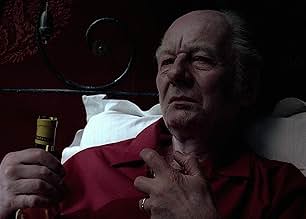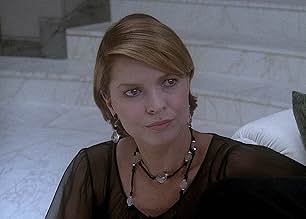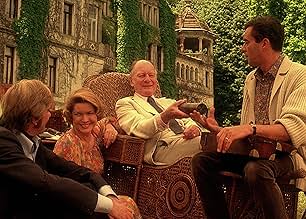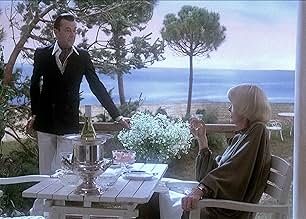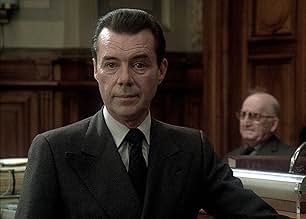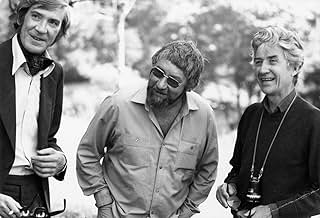IMDb-BEWERTUNG
7,4/10
3646
IHRE BEWERTUNG
Füge eine Handlung in deiner Sprache hinzuA dying writer bases his last book on his own perception of his family.A dying writer bases his last book on his own perception of his family.A dying writer bases his last book on his own perception of his family.
- Auszeichnungen
- 11 Gewinne & 2 Nominierungen insgesamt
Denis Lawson
- Dave Woodford
- (as Dennis Lawson)
Empfohlene Bewertungen
I saw this film at release and have seen it several times since and this motion picture still holds up, a seemingly complex story that unravels steadily
throughout the film. Resnais uses every dramatic device available to tell what becomes a moving and tender portrait, not least visual puns, particularly a
sequence where Dirk Bogarde drives across "town", in which a very simple
montage predates digital morphing as seen in current commercials, smoothly
linked through the activity of the character. All good Resnais films include an examination of the minds of his characters and this is a superb twist-and-turn reality that involves us completely. The acting of course is flawless and includes a wonderful pairing of the great Elaine Stritch and Ellen Burstyn. David Warner, a personal favorite, is actually given the opportunity to act and steps up to the plate and compliments Dirk Bogarde's cool and wooden portrait. I regularly look for this release on DVD and am consistently disappointed. Could someone
publish it soon?
throughout the film. Resnais uses every dramatic device available to tell what becomes a moving and tender portrait, not least visual puns, particularly a
sequence where Dirk Bogarde drives across "town", in which a very simple
montage predates digital morphing as seen in current commercials, smoothly
linked through the activity of the character. All good Resnais films include an examination of the minds of his characters and this is a superb twist-and-turn reality that involves us completely. The acting of course is flawless and includes a wonderful pairing of the great Elaine Stritch and Ellen Burstyn. David Warner, a personal favorite, is actually given the opportunity to act and steps up to the plate and compliments Dirk Bogarde's cool and wooden portrait. I regularly look for this release on DVD and am consistently disappointed. Could someone
publish it soon?
How often do we awake from our dreams in a sweat, not knowing what is real and what is illusion? Especially if we are feverish, our dreams can turn close friends or family members into ogres and hateful creatures (or possibly werewolves) who are bent on our destruction. Such is the case with novelist Clive Langham (John Gielgud), a dying 78 year-old writer who is working on his final novel in the playfully bizarre 1977 English language film, Providence, by Alain Resnais (Hiroshima Mon Amour, Last Year at Marienbad, Muriel). The film depicts how physical and mental anguish can distort our view of reality. A poetic screenplay by playwright David Mercer and powerful performances by John Gielgud, Ellen Burstyn, Dirk Bogarde, Elaine Strich, and David Warner provide strong support.
Clive does not go gentle into that good night. During one horrific night, all the pain of his life and disturbing family relationships boil to the surface. In the novel being played out in the author's mind, his family members, sons Claude (Dirk Bogarde) and Kevin (David Warner), and Claude's wife Sonia (Ellen Burstyn), mysteriously become the main protagonists, assuming roles as prosecutors and defendants, feuding spouses, and extra-marital lovers. As Clive goes deeper into the maelstrom, images become more and more hallucinatory. The denouement is witty, baffling, irritating, and then finally transcendent. To say that the ending is a surprise is a major understatement.
Providence may exasperate you but, if you have patience, it can be a richly rewarding experience. As with all thought provoking and multi-layered films, multiple viewing may be required for full appreciation. Providence was voted the greatest film of the '70s by an international jury of critics and, at Telluride, Norman Mailer called it "the greatest film ever made on the creative process".
Clive does not go gentle into that good night. During one horrific night, all the pain of his life and disturbing family relationships boil to the surface. In the novel being played out in the author's mind, his family members, sons Claude (Dirk Bogarde) and Kevin (David Warner), and Claude's wife Sonia (Ellen Burstyn), mysteriously become the main protagonists, assuming roles as prosecutors and defendants, feuding spouses, and extra-marital lovers. As Clive goes deeper into the maelstrom, images become more and more hallucinatory. The denouement is witty, baffling, irritating, and then finally transcendent. To say that the ending is a surprise is a major understatement.
Providence may exasperate you but, if you have patience, it can be a richly rewarding experience. As with all thought provoking and multi-layered films, multiple viewing may be required for full appreciation. Providence was voted the greatest film of the '70s by an international jury of critics and, at Telluride, Norman Mailer called it "the greatest film ever made on the creative process".
Not enough can truly be said for this film. Equally, nothing can change people's reaction to it; it is an art piece which separates people. Early reviews from the period of its release seem unfriendly at least. Many reviewers found the film pretentious and constructionally difficult. Many claimed it attempted more mystery than it had a right to. I feel this was a film ahead of its time, and any pomposity in the film comes not from its center, but from its central character, Clive Langham (John Gielgud). This, more than almost any film of the 20th century, is a film which rewards the viewer for multiple viewings. If you are often accused of being obsessive, overly-analytic or just plain artsy, this film will tickle you in some very personal places. The message I will refuse to comment on, though it is very deeply personal to me, and, I would say, to all writers. But the "crux of the biscuit," if you will, is this: examine the title in relation to the film.
10jfb-4
Don't be put off by what people (including lovers of the film) say about its initially being confusing. Even the first time through, it is madly enjoyable second by second, and it needn't take long to figure out what is going on. In fact, once you know that we are into a dying man's dreams/fantasies/wishes regarding his own family, you have all you need to make sense of virtually everything straight off. By the end, everything has locked into place in a most satisfying way. The contrast between the man's dreams about his family and what you see when they appear in person near the end is one of the most delicious things in the whole of art.
10davidf33
A double header of complex imagination (first part) and painful recrimination (second part) in this film of deep feeling and hurt seen through the eyes of the dying author (John Gielgud). David Mercer's script includes all his life long angst of the relationship of father and son, although now in his final years fought out with more complex and participating female characters in the ghost of his dead wife, who doubles as his son's mistress (Elaine Stritch) and daughter-in-law (Ellen Burstyn).
The acting is pure poetry with John Geilgud at his refined best as the drunken and dying author in part celebrating his life of drunken womanising and in part regretting the pain that he has caused, in particular to his family. Dirk Borgarde performing the impossible task of being two imaginary characters and one real one with seemless effort. As the son of the dying author he carries all the pain and hatreds of the dying father both in the old man's fantasy and in his real life of inherited disillusionment. His relationship with his wife and mistress (in practice his mother! complex eh!) changes from the deeply loving to the perceive accusatory of the old man's increasingly drunken imagination.
Ellen Burstyn gives one of her finest film performances as the long suffering wife ,but in the end all the plaudits go to the writer. The style may be only that of the one-liner but each of them hits as an aphorism from the greatest of philosophical minds. The revolving characters of the final part of the authors dreaming make a bewildering tapestry of the imagination.
A fabulous movie, but one that will take many viewings to actually comprehend the complexities of it. Set that video!!
The acting is pure poetry with John Geilgud at his refined best as the drunken and dying author in part celebrating his life of drunken womanising and in part regretting the pain that he has caused, in particular to his family. Dirk Borgarde performing the impossible task of being two imaginary characters and one real one with seemless effort. As the son of the dying author he carries all the pain and hatreds of the dying father both in the old man's fantasy and in his real life of inherited disillusionment. His relationship with his wife and mistress (in practice his mother! complex eh!) changes from the deeply loving to the perceive accusatory of the old man's increasingly drunken imagination.
Ellen Burstyn gives one of her finest film performances as the long suffering wife ,but in the end all the plaudits go to the writer. The style may be only that of the one-liner but each of them hits as an aphorism from the greatest of philosophical minds. The revolving characters of the final part of the authors dreaming make a bewildering tapestry of the imagination.
A fabulous movie, but one that will take many viewings to actually comprehend the complexities of it. Set that video!!
Wusstest du schon
- WissenswertesSir John Gielgud, who spent most of his career on the stage, considered this movie and the television mini-series Wiedersehen mit Brideshead (1981) to be his only two screen appearances of which he was genuinely proud.
- Zitate
Clive Langham: Don't you think to have only one bastard after sixty years of action is almost tantamount to self denial?
- Crazy CreditsThe National Philharmonic Orchestra is misspelled as National Philarmonic Orchestra in the opening credits.
- VerbindungenFeatured in Zomergasten: Folge #7.4 (1994)
Top-Auswahl
Melde dich zum Bewerten an und greife auf die Watchlist für personalisierte Empfehlungen zu.
Details
- Laufzeit1 Stunde 50 Minuten
- Farbe
- Seitenverhältnis
- 1.78 : 1(original ratio)
Zu dieser Seite beitragen
Bearbeitung vorschlagen oder fehlenden Inhalt hinzufügen


